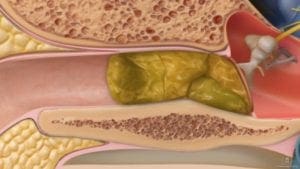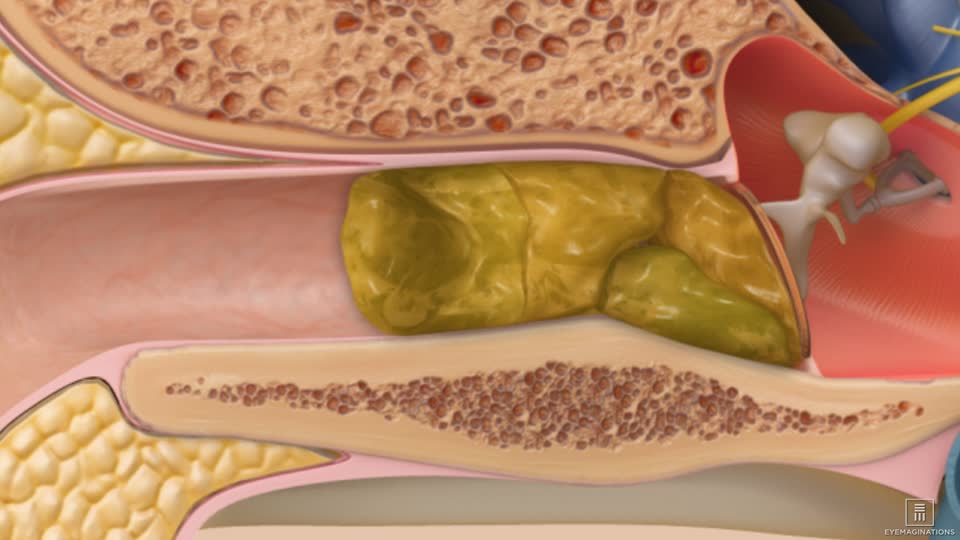 Why do our ears get blocked with wax?
Why do our ears get blocked with wax?
Have you previously suffered from ear wax problems? Then read on…
A question we regularly get asked at Click Hearing is ‘Why have my ears suddenly got blocked with wax?’
Many of us have suffered with ear wax blocking our ears giving a feeling of congestion, general itchiness or a sudden hearing loss.
But what is ear wax and why is it there?
Ear wax is not a wax at all, its name coming more from its texture than anything else. It is actually made up of dead skin cells, hair, dust and the secretions of the ceruminous and the sebaceous glands. The technical term for this strange and tacky substance is Cerumen.
Ear wax provides both a protective coating to the skin in your ear canal as well as helping to clean it. Ear wax offers protection from as much dirt and germs that your lifestyle throws at you.
Every time you move your jaw, through eating or talking, the ear wax is gradually moved outwards from inside the ear until it just falls out, normally without you realising. Your body makes ear wax all of the time but the amount does vary from person to person.
Why does ear wax block my ears?
Sometimes wax can cause a blockage or ‘plug’ and these plugs can be more likely if you:
- are just someone who generates more wax than others.
- have narrow or hairy ear canals.
- have a dry skin problem such as eczema or psoriasis.
- wear hearing aids or use audio ear plugs frequently.
- use cotton buds to clean your ear, often forcing the ear wax further into the ear! Don’t!
- use other ‘ingenious’ tools such as keys, pens, matchsticks etc. to try and remove wax yourself. Don’t!
It’s also the case that as we become older the wax we produce becomes drier. This also makes it harder and more difficult to drop out of its own accord. Additionally, some people might have excess hair growth in their ear which can be a catalyst in blocking the ear along with the earwax. Such people tend to get those excessive hairs removed professionally from a place like Semper Laser Hair Removal or similar laser clinics near them. This might help in preventing frequent ear blockages. Having said that, it would be advisable to consult with an ear doctor prior to the procedure.
How to manage the build up of ear wax and its removal
One of the most common ways in which you can help to prevent too much wax forming is to introduce the regular use of olive oil or almond oil. This helps soften the wax, helping it to fall out of the ear on its own accord. We also recommend Earol, an olive oil spray – it’s safe and easy to administer, so you’re more likely to keep using it. We keep plenty in stock at our shops or you can order it online here.
This won’t work for everyone however, so let us know if you need to have the wax professionally removed. Micro-suction is our preferred method of removal; ear irrigation with water is much less common in general practice today and not something that we routinely do at our offices.
Are there any alternatives?
Not really. We would certainly suggest staying clear of ear candles. Apart from the risk of burns to the face and the ear itself they can actually contribute to the build up of wax making your problem worse. It’s been shown that what emerges on the ear candle isn’t ear-wax but just candle-wax and soot.
So, if you do have an ear wax problem just contact us and we’ll be happy to offer a solution to your problem.
We have a dedicated ear wax removal page here where you can also view a video showing how we remove wax using microsuction


I have tried every hearing aid place to remove my build up of wax, needed every 6 to 12 months as it clogs up my hearing aids. No one can give m3 an appointment. Drs can’t help. What do I do?? Costing me a fortune to replace filters in my hearing aids
Hi Sue, I’m not sure where you are based but if in Essex then book in for one of our ear wax removal appointments and we’ll try and get to the bottom of of your problem, including your hearing aids. If not close to Essex then please visit the AIHHP website (just google AIHHP) and you will be able to find an approved independent audiologist near you for help.
Regards Click Hearing